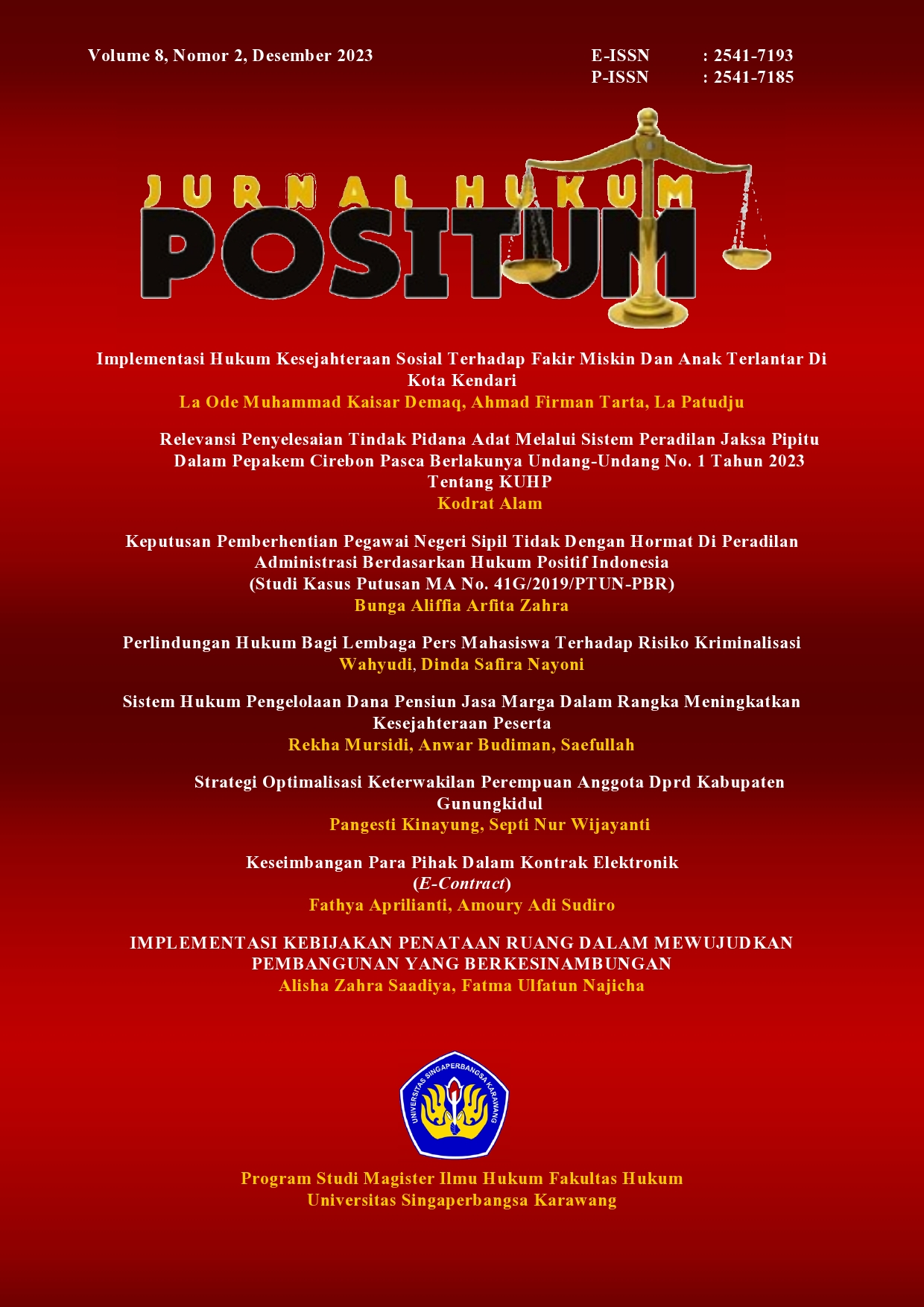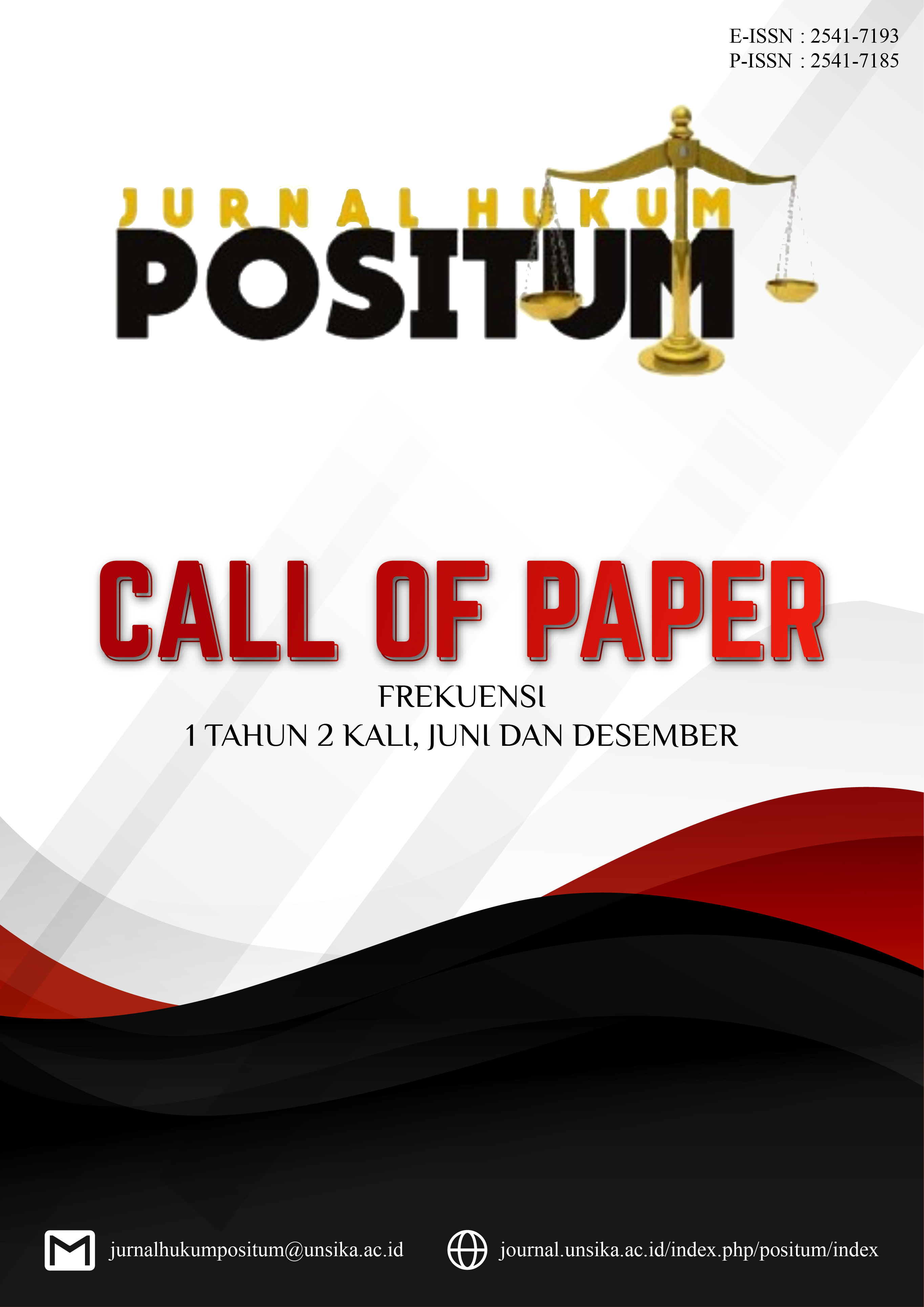PERLINDUNGAN HUKUM BAGI LEMBAGA PERS MAHASISWA TERHADAP RISIKO KRIMINALISASI
DOI:
https://doi.org/10.35706/positum.v8i2.10303Abstrak
The press is an institution that actualizes one of the points of human rights, namely freedom of association and expressing thoughts orally and in writing. The existence of the press has its function for society, based on people's sovereignty by the principles of democracy, justice, and the supremacy of law as a concreteization of press freedom. However, this is not the case for the position of the student press which is considered not to be a legal entity because it is still within the campus structure. Apart from that, in their activities, students cannot regularly carry out journalistic activities because they still have academic responsibilities as students. With these two aspects, it seems as if student press institutions do not meet the legal standards of press institutions, so the protection they should protect becomes unclear. Even though it is under the auspices of the campus, the editorial activities of the student press are independent without interference from the campus. As a result, if the news is about issues that offend the campus, criminalization of the student press is inevitable, especially in defamation and hate speech. Using the normative juridical method, by analyzing qualitatively it can be understood that the position of the student press seems to be constrained from all directions, between its status as a student and on the other hand as a press which should hold freedom and responsibility according to its function. So, the opportunity for all kinds of intimidation, such as threats, repressive actions and even banning, is not impossible for the student press. In the absence of legal protection, student press activities in carrying out the press function of disseminating information are hampered.
Unduhan
Referensi
Alhakim, Abdurrakhman. “Urgensi Perlindungan Hukum Terhadap Jurnalis Dari Risiko Kriminalisasi UU Informasi Dan Transaksi Elektronik Di Indonesia.” Jurnal Pembangunan Hukum Indonesia 4, no. 1 (2022): 89–106. https://doi.org/10.14710/jphi.v4i1.89-106.
Hasan, Adil Al. “Catatan Kasus Pers Mahasiswa 2020-2021.” Perhimpunan Pers Mahasiswa Indonesia, 2022. https://www.persma.id/catatan-kasus-pers-mahasiswa-2020-2021/.
Hikmat, Mahi M. Jurnalistik: Literary Journalism. 1st ed. Jakarta Timur: Prenadamedia Group, 2018.
Ikhsan, and Reza Dwi. “Manajemen Redaksional Berita Online Pers Mahasiswa (Studi Komparasi Manajemen Redaksional Pada Media Online Website Lembaga Pers Mahasiswa Balairung UGM, Ekspresi UNY, Dan Himmah UII),” 2017. https://dspace.uii.ac.id/handle/123456789/7391.
LPM Redlines. “Sejarah Pergerakan Pers Mahasiswa Indonesia (1908-1998),” 2013. https://www.lpmredline.com/2015/06/sejarah-pergerakan-pers-mahasiswa.html.
Muhammad Irfan. Lembaga Pers Mahasiswa (LPM) Institut Sebagai Kontrol Kehidupan Kampus (Studi Wacana Uang Kuliah Tunggal Pada LPM Institut UIN Syarif Hidayatullah Jakarta), 2022.
Muslimin, M. “Ide Kriminalisasi Negara Terhadap Pembiaran Kejahatan Pada Kemerdekaan Pers.” Prosiding Seminar Nasional Hukum UMS, no. 40 (2018): 456–70. https://publikasiilmiah.ums.ac.id/xmlui/handle/11617/9718.
Qorib, Fathul. Teknik Reportase Dan Penulisan Berita. Malang: Intrans Publishing, 2018.
Rahayu, Mella Ismelina Farma. “Kebebasan Pers Dalam Konteks KUHP Pidana: Menyoal Undang-Undang Sebagai Fungsi Komunikasi.” Mediator: Jurnal Komunikasi 8, no. 1 (2007): 125–30. https://doi.org/10.29313/mediator.v8i1.1232.
Shodikin, Miftakhul. “Kedudukan Hukum Terhadap Lembaga Pers Mahasiswa Ditinjau Dari Undang-Undang Nomor 40 Tahun 1999 Tentang Pers.” Jurnal Hasil Penelitian 17 8, no. 1 (2022): 2579–7980. http://jurnal.untag-sby.ac.id/index.php/jhp17.
Supriyanto, Didik. Perlawanan Pers Mahasiswa: Protes Sepanjang NKK/BKK. Jakarta: PT Penebar Swadaya, 1998.
Wadjo, Hadibah Zachra. “Pencemaran Nama Baik Dalam Pemberitaan Pers.” Sasi 17, no. 2 (2011): 53. https://doi.org/10.47268/sasi.v17i2.353.
##submission.downloads##
Diterbitkan
Cara Mengutip
Terbitan
Bagian
Lisensi
1. Hak publikasi jurnal menjadi milik pengelola jurnal dengan sepengetahuan penulis, sedangkan hak moral publikasi menjadi milik penulis.
2. Aspek legal formal terhadap aksesibilitas publikasi jurnal mengacu pada lisensi Creative Commons Atribusi-NonCommercial-No Derivative (CC BY-NC-ND), yang berarti bahwa publikasi dapat dimanfaatkan dengan tujuan non-komersial dan dalam bentuk aslinya (tidak dapat dimodifikasi).
3. Setiap publikasi jurnal (cetak/elektronik) bersifat open access untuk tujuan pendidikan, penelitian, dan perpustakaan. Di luar tujuan tersebut, pengelola jurnal tidak bertanggung jawab atas pelanggaran hak cipta yang dilakukan oleh pihak tertentu.














